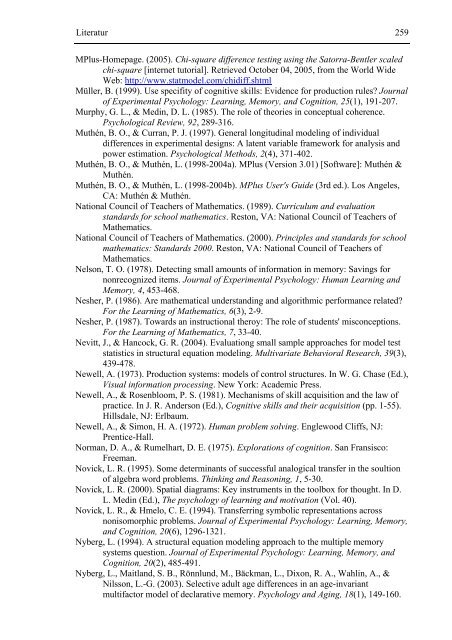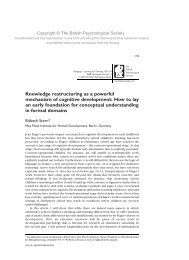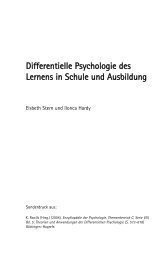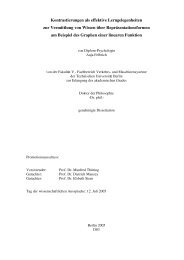Konzeptuelles und prozedurales Wissen als latente Variablen: Ihre ...
Konzeptuelles und prozedurales Wissen als latente Variablen: Ihre ...
Konzeptuelles und prozedurales Wissen als latente Variablen: Ihre ...
Sie wollen auch ein ePaper? Erhöhen Sie die Reichweite Ihrer Titel.
YUMPU macht aus Druck-PDFs automatisch weboptimierte ePaper, die Google liebt.
Literatur 259<br />
MPlus-Homepage. (2005). Chi-square difference testing using the Satorra-Bentler scaled<br />
chi-square [internet tutorial]. Retrieved October 04, 2005, from the World Wide<br />
Web: http://www.statmodel.com/chidiff.shtml<br />
Müller, B. (1999). Use specifity of cognitive skills: Evidence for production rules? Journal<br />
of Experimental Psychology: Learning, Memory, and Cognition, 25(1), 191-207.<br />
Murphy, G. L., & Medin, D. L. (1985). The role of theories in conceptual coherence.<br />
Psychological Review, 92, 289-316.<br />
Muthén, B. O., & Curran, P. J. (1997). General longitudinal modeling of individual<br />
differences in experimental designs: A latent variable framework for analysis and<br />
power estimation. Psychological Methods, 2(4), 371-402.<br />
Muthén, B. O., & Muthén, L. (1998-2004a). MPlus (Version 3.01) [Software]: Muthén &<br />
Muthén.<br />
Muthén, B. O., & Muthén, L. (1998-2004b). MPlus User's Guide (3rd ed.). Los Angeles,<br />
CA: Muthén & Muthén.<br />
National Council of Teachers of Mathematics. (1989). Curriculum and evaluation<br />
standards for school mathematics. Reston, VA: National Council of Teachers of<br />
Mathematics.<br />
National Council of Teachers of Mathematics. (2000). Principles and standards for school<br />
mathematics: Standards 2000. Reston, VA: National Council of Teachers of<br />
Mathematics.<br />
Nelson, T. O. (1978). Detecting small amounts of information in memory: Savings for<br />
nonrecognized items. Journal of Experimental Psychology: Human Learning and<br />
Memory, 4, 453-468.<br />
Nesher, P. (1986). Are mathematical <strong>und</strong>erstanding and algorithmic performance related?<br />
For the Learning of Mathematics, 6(3), 2-9.<br />
Nesher, P. (1987). Towards an instructional theroy: The role of students' misconceptions.<br />
For the Learning of Mathematics, 7, 33-40.<br />
Nevitt, J., & Hancock, G. R. (2004). Evaluationg small sample approaches for model test<br />
statistics in structural equation modeling. Multivariate Behavioral Research, 39(3),<br />
439-478.<br />
Newell, A. (1973). Production systems: models of control structures. In W. G. Chase (Ed.),<br />
Visual information processing. New York: Academic Press.<br />
Newell, A., & Rosenbloom, P. S. (1981). Mechanisms of skill acquisition and the law of<br />
practice. In J. R. Anderson (Ed.), Cognitive skills and their acquisition (pp. 1-55).<br />
Hillsdale, NJ: Erlbaum.<br />
Newell, A., & Simon, H. A. (1972). Human problem solving. Englewood Cliffs, NJ:<br />
Prentice-Hall.<br />
Norman, D. A., & Rumelhart, D. E. (1975). Explorations of cognition. San Fransisco:<br />
Freeman.<br />
Novick, L. R. (1995). Some determinants of successful analogical transfer in the soultion<br />
of algebra word problems. Thinking and Reasoning, 1, 5-30.<br />
Novick, L. R. (2000). Spatial diagrams: Key instruments in the toolbox for thought. In D.<br />
L. Medin (Ed.), The psychology of learning and motivation (Vol. 40).<br />
Novick, L. R., & Hmelo, C. E. (1994). Transferring symbolic representations across<br />
nonisomorphic problems. Journal of Experimental Psychology: Learning, Memory,<br />
and Cognition, 20(6), 1296-1321.<br />
Nyberg, L. (1994). A structural equation modeling approach to the multiple memory<br />
systems question. Journal of Experimental Psychology: Learning, Memory, and<br />
Cognition, 20(2), 485-491.<br />
Nyberg, L., Maitland, S. B., Rönnl<strong>und</strong>, M., Bäckman, L., Dixon, R. A., Wahlin, A., &<br />
Nilsson, L.-G. (2003). Selective adult age differences in an age-invariant<br />
multifactor model of declarative memory. Psychology and Aging, 18(1), 149-160.





